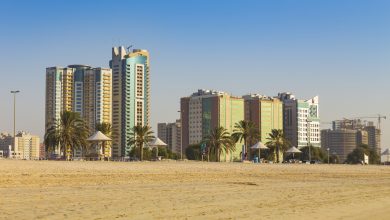Despite the first reported case of Wuhan coronavirus in the UAE, the risk of its spread in the country remains low due to ramped up efforts and preventive measures that the government had put in place.
On January 29, the UAE Ministry of Health and Prevention (MoHAP) reported the first case of what health officials have termed as the novel coronavirus or 2019-nCoV.
The ministry said the family of four who came from Wuhan, the ground zero of the outbreak in China, is now in stable condition and remains on a tight watch of health authorities.
READ MORE: Wuhan virus death toll jumps to 170
It also allayed concerns saying, “The general health condition is not a cause for concern.”
MoHAP is also confident that the country is well equipped with the right knowledge and expertise in handling any emergency that poses risk to health and well-being of its residents, with its reliable epidemiological investigation centers and health workers on the frontline.
“All the necessary precautions in accordance with the scientific recommendations, conditions and standards approved by the World Health Organization [are being taken],” MoHAP added. “The health system in the country works very efficiently and that the ministry is closely following the situation in a way that guarantees the health and safety of everyone.”
Even police forces in the country are working round the clock at all points of entry across the emirates. Major General Abdullah Khalifa Al Marri, Commander-in-Chief of Dubai Police, and also Head of the Crises and Disasters Team in Dubai, inspected the measures being implemented at Dubai Airports.
The new strain of coronavirus has sparked global attention as no country could be immune. As of Wednesday, a thousandfold of cases has been recorded in parts of China, where hospitals and health workers have been overstretched to contain the virus and treat patients. The death toll in this Asian country now has reached over 130 with nearly 6,000 found to have contracted the deadly virus. The youngest confirmed case is that of a nine-month-old girl in Beijing.
The epicenter of the outbreak, Wuhan city in Hubei province, has been locked down affecting some 60 million travelers who have been barred from transporting to and from the city.
The “grave situation”, as described by Chinese President Xi JinPing, has called for the suspension of major transportation systems in the city, affecting the movement of the people including some 300 Filipinos in Hubei province. Over 150 of them are living and working in Wuhan.
Aside from mainland China, other major cities and countries have also reported a handful of cases. Although there are no reported deaths in overseas cases of the novel coronavirus, the world still grapples to find its cure.
The Filipino Times listed everything you need to know about the outbreak.
Top 14 questions about 2019-nCoV
1 What is coronavirus?
According to the World Health Organization (WHO), coronaviruses are a large family of viruses that are known to cause illnesses ranging from the common cold to more severe diseases such as Middle East Respiratory Syndrome (MERS-CoV) and Severe Acute Respiratory Syndrome (SARS).
Coronavirus is named after their crown-like shape and is zoonotic, which means it can be transmitted between animals and humans.
The common signs of the disease include respiratory symptoms, fever, cough, shortness of breath, and breathing difficulties. In more severe cases, infection can cause pneumonia, severe acute respiratory syndrome, kidney failure and worse death, as per WHO.
2 Is 2019-nCoV the same as MERS-CoV or SARS?
The deadly virus that emerged in Wuhan belongs to a family of viruses that include the common cold, and viruses such as SARS and MERS-CoV, according to WHO. Hence, SARS, MERS-CoV and 2019-nCoV belong to a family of coronavirus, as they all emerged from an animal source.
3 How did the recent outbreak occur?
The Wuhan Municipal Health Commission reported 44 initial cases of viral pneumonia of unknown origin on January 3. The patients tested negative from tests such as influenza, avian influenza, adenovirus, infectious atypical pneumonia (SARS) and the Middle East Respiratory Syndrome (MERS-CoV).
Studies conducted by China’s Center for Disease Control (CDC) revealed that the virus might originated from wildlife being sold in Huanan Seafood Wholesale Market in Wuhan. The market is also known for wildlife trade, where numerous animals such as live bats, civet cats, monkeys and snakes were being sold.
4 How does 2019-nCoV spread?
The virus can spread through human-to-human and animal-to-person transmissions or through direct contact to the seafood market where the virus originated, according to the National Health Commission of China and Centers for Disease Control & Prevention (CDC) in the United States.
5 I have runny nose, cough and fever. Should I be alarmed?
According to the Department of Health (DOH) in the Philippines, only those who have travel history in China or had contact with patients afflicted with the virus have reasons to be wary if they are suffering from cough, cold and fever. “All those factors should be considered before one can be suspected of having acquired the new virus. So, if one has a cough or runny nose, but did not come from Wuhan, that is not 2019-nCoV. It’s just flu season in the Philippines,” Department of Health Undersecretary Eric Domingo explained.
6 What measures are being taken to protect the UAE residents?
His Highness Sheikh Mohamed bin Zayed Al Nahyan, Crown Prince of Abu Dhabi and Deputy Supreme Commander of the UAE Armed Forces, is closely following recent developments regarding 2019-nCoV as well as the Chinese government’s efforts to contain the spread of the coronavirus.
“We’re confident in their [China] ability to overcome this crisis,” His Highness Sheikh Mohamed bin Zayed stressed in a tweet, while assuring the public of UAE’s readiness “to provide all support to China and cooperate with the international community to tackle this virus”.
This, as the UAE raised the level of alertness at the border crossings, following a close assessment of the domestic and external situation. Thermal screening of arriving passengers at airports also has been rolled out as a precautionary measure. As reported the Emirates News Agency WAM, concerned authorities discussed in detail the steps taken to ensure full emergency preparedness.
7 What’s the current travel advice for UAE residents?
As a precautionary measure to protect its residents, the UAE has urged all its citizens to avoid traveling to China as cases of 2019-nCoV continues unabated in the Asian country.
“The Ministry of Foreign Affairs calls upon the citizens of the country to postpone travel to the People’s Republic of China except in cases of extreme necessity,” the Ministry’s tweet read in part.
8 Is there any suspected cases in the Philippines?
As of Wednesday, DOH said they are monitoring 23 patients under investigation (PUIs). Initially, eighteen were being monitored in the National Capital Region, but one of them died. The cause of death is still unknown. The three others were discharged already after they tested negative for the new strain of coronavirus.
The patients all have a travel history to Wuhan.
9 Is there any Filipino PUIs among the cases being closely monitored in PH?
None of the patients under investigation (PUIs) or those suspected of having contracted the mysterious respiratory illness are Filipinos and most are Chinese nationals, as per Health Secretary Francisco Duque III. He said that DOH still awaits the six confirmatory tests from Australia. Hence, there are still no confirmed cases of 2019-nCoV in the country.
10 What measures are being taken to protect the Philippines from nCoV?
Authorities in the country decided to implement suspension of all flights from Wuhan. They are also monitoring all other flights from China as part of the preventive measures.
Passengers from China are being required to submit their health declaration card and to indicate their travel history.
11 How does the Philippines carry out the confirmatory test?
Currently, DOH is still awaiting test results of 13 patients and six more confirmatory results. Testing of the specimen of the virus is currently being handled by the local Research Institute for Tropical Medicine in Muntinlupa. The institute screens if the samples are positive for non-specific pancoronavirus assay. Those that would test positive are sent to the Victorian Infectious Disease Reference Laboratory in Australia to identify the specific coronavirus strain. Recently, DOH said it will receive a ‘primer’ from Japan that can determine 2019-nCoV among suspected patients
12 Is the Philippines mulling repatriation of Filipinos from Wuhan?
Foreign Affairs Undersectretary Brigido Dulay said Wuhan-based Filipinos who wish to be repatriated can return to the Philippines under quarantine for two weeks. Duque in a press briefing on Tuesday said, “We are now arranging one place where we can quarantine all of them for case management rather than assigning them to different facilities.” The logistical and medical cost of those who will be quarantined for two weeks, according to the health secretary.
13 What’s the current travel advice of the Philippine government?
The Immigration Bureau has ordered the suspension of ‘visa upon arrival’ (VUS) issuance to Chinese nationals amid the situation in mainland China.
“We are now temporarily suspending the issuance of VUA for Chinese nationals to slow down the influx of group tours,” Immigration Commissioner Jaime Morente said in a statement.
The Immigration Bureau, however, clarified that there is no order to bar Chinese nationals from entering the country, adding that there is no directive from the national government.
The Philippine Amusement and Gaming Corporation (PAGCOR) also imposed a 10-day quarantine on newly hired and returning workers of Philippine Offshore Gaming Operators (POGOs) from 2019-nCoV affected countries
14 In Wuhan, what’s the current situation of Filipinos living in the city?
There are about 300 Filipinos in the Hubei province and over 150 are in Wuhan City. Department of Foreign Affairs Undersecretary Bridigo Dulay said the government is now coordinating with Beijing.
“They have assured us that they are ready to address all of the concerns that any Filipino may have in that area,” Dulay explained.
Meantime, Philippine Ambassador to China Jose Santiago “Chito” Sta. Romana told Filipinos in China to stay indoors and minimize their contact with crowds amid the rising number of infected individuals as well as fatalities.






